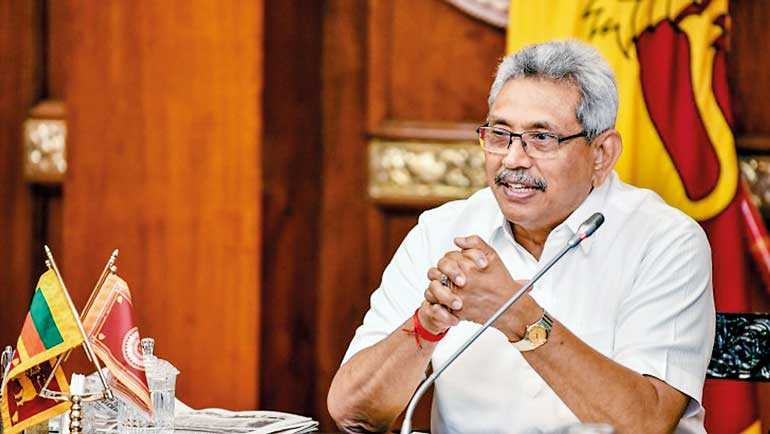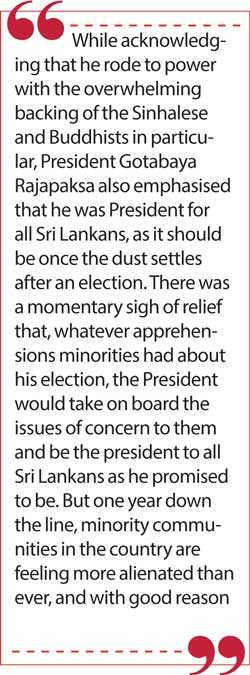Wednesday Feb 25, 2026
Wednesday Feb 25, 2026
Tuesday, 12 January 2021 01:12 - - {{hitsCtrl.values.hits}}

It’s not too late for the Government and especially the President to reach out to all Sri Lankans and listen to their concerns if he is sincerely committed to being the President for all; otherwise, these are words that ring hollow and are meaningless when actions so far have proven otherwise
By Chandani Kirinde
In May 2010, a year after the military defeat of the LTTE, the then President – current Prime Minister – Mahinda Rajapaksa appointed a Commission of Inquiry (CoI), ironically called the ‘Lessons Learnt and Reconciliation Commission’ (LLRC).
Ten years later, the recommendations of the commission, like those of many such commissions, remain confined to words, because learning lessons is not a strong Sri Lankan trait and events in the past few months illustrate that more than ever.
When Gotabaya Rajapaksa became President in November 2019, he rode to power with the overwhelming backing of the Sinhalese and Buddhists in particular. It is a fact the President has publicly acknowledged – once on the day he took oaths as President and again on the day that marked his first year in office.
While acknowledging this fact, he also emphasised that he was President for all Sri Lankans, as it should be once the dust settles after an election. There was a momentary sigh of relief that, whatever apprehensions minorities had about his election, the President would take on board the issues of concern to them and be the president to all Sri Lankans as he promised to be. But one year down the line, minority communities in the country are feeling more alienated than ever, and with good reason.
Using COVID-19 to scapegoat Muslims
Being elected to office just before the onset of COVID-19 pandemic in March last year posed more challenges to the President than those he would have had to deal with otherwise and to the Government’s credit, prompt steps were taken to keep the spread of the virus under control during its first wave.
There was the hope then that all Sri Lankans would come together to fight the common enemy – COVID-19 – but the fight against the coronavirus soon became an instrument to scapegoat the Muslim community.
The cremation vs. burial issue was of the Government’s own making and even if one is to believe that the decision taken in April was due to ‘fear of an unknown virus’, sticking stubbornly to this policy 10 months down the line, when scientists and the medical community in the country overwhelmingly agree that both modes of disposal of bodies for COVID-19 victims are acceptable, only points in one direction. That is, this Government’s decision is not guided by reason but by its need to keep a certain segment of its voters satisfied by hardening its attitude towards minorities.
Tamils too being pushed against the wall
On top of hurting the sentiments of the Muslims community, members of the Tamil community too are being pushed against the wall once again. On Friday, the Police moved into Jaffna University and removed a monument to the war dead. This will no doubt ignite protests and the fall out of this highhanded action will be seen in the days ahead.
Acts like these only give more credence to detractors of the President who, even before his election, feared that minorities would fare badly under his administration. Neither his actions nor of those in this Government have shown that they care to prove anything to the contrary.
It is also rather morbid that the Government is too fixated with the dead to care about the sentiments of the living. Be it conducting the last rites of a loved one according to one’s faith or remembering a loved one who has passed on, these are deeply personal experiences which must be respected and addressed with empathy and compassion.
In a country where the majority are followers of the teachings of Lord Buddha whose universal message of tolerance and compassion has been embraced by millions the world over, those who very publicly profess to be followers of these teachings sadly lack the same traits when dealing with minorities in the country.
Reconciliation: It’s not too late
The LLRC in its final report which was handed over to then President Mahinda Rajapaksa gave a roadmap on how the country can begin to heal collectively after years of war.
“Seeds of reconciliation can take root only if there is forgiveness and compassion. Leaders of all sides should reach out to each other in humility and make a joint declaration, extending an apology to innocent citizens who fell victim to this conflict, because of the collective failure of the political leadership on all sides to prevent such a conflict from emerging,” the report said.
It’s not too late for the Government and especially the President to reach out to all Sri Lankans and listen to their concerns if he is sincerely committed to being the President for all. Otherwise, these are words that ring hollow and are meaningless when actions so far have proven otherwise.